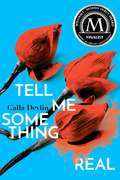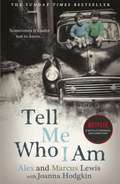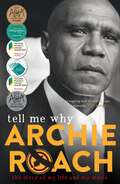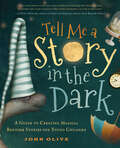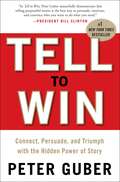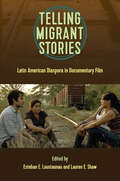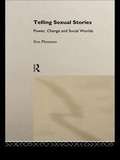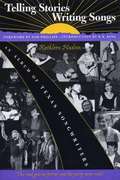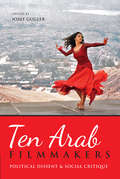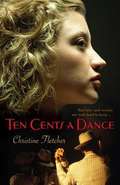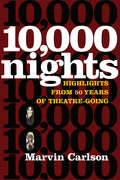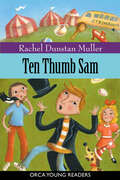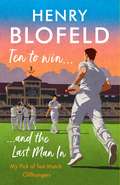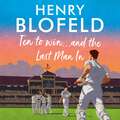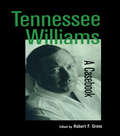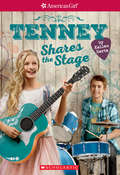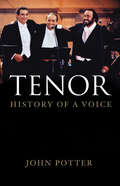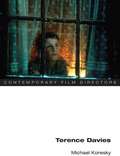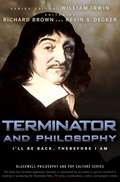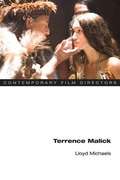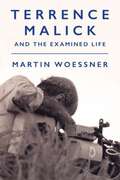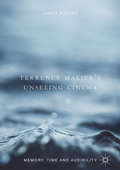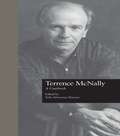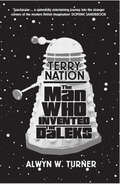- Table View
- List View
Tell Me Something Real
by Calla Devlin<p>Three sisters struggle with the bonds that hold their family together as they face a darkness settling over their lives in this masterfully written debut novel. <p>There are three beautiful blond Babcock sisters: gorgeous and foul-mouthed Adrienne, observant and shy Vanessa, and the youngest and best-loved, Marie. Their mother is ill with leukemia and the girls spend a lot of time with her at a Mexican clinic across the border from their San Diego home so she can receive alternative treatments. <p>Vanessa is the middle child, a talented pianist who is trying to hold her family together despite the painful loss that they all know is inevitable. As she and her sisters navigate first loves and college dreams, they are completely unaware that an illness far more insidious than cancer poisons their home. Their world is about to shatter under the weight of an incomprehensible betrayal...</p>
Tell Me Who I Am: The Story Behind the Netflix Documentary
by Joanna Hodgkin Alex And Marcus LewisThe story behind the hit Netflix documentary: The bestselling account of the bond between brothers and the shocking legacy of a dangerous mother.Imagine waking up one day to discover that you have forgotten everything about your life. Your only link with the past, your only hope for the future, is your identical twin.Now imagine, years later, discovering that your twin had not told you the whole truth about your childhood, your family, and the forces that had shaped you. Why the secrets? Why the silences? You have no choice but to begin again.This has been Alex's reality: a world where memories are just the stories people tell you, where fact and fiction are impossible to distinguish. With dogged courage he has spent years hunting for the truth about his hidden past and his remarkable family. His quest to understand his true identity has revealed shocking betrayals and a secret tragedy, extraordinary triumph over crippling adversity and, above all, redemption founded on brotherly love.Marcus his twin brother has sometimes been a reluctant companion on this journey, but for him too it has led to staggering revelations and ultimately the shedding of impossible burdens. Their story spans continents and eras, from 1950s debutantes and high society in the Home Counties to a remote island in the Pacific and 90s raves. Disturbing, funny, heart-breaking and affirming, Alex and Marcus's determination to rebuild their lives makes us look afresh at how we choose to tell our stories.
Tell Me Why: The Story of My Life and My Music
by Archie RoachA powerful memoir of a true Australian legend: stolen child, musical and lyrical genius, and leader. Not many have lived as many lives as Archie Roach – stolen child, seeker, teenage alcoholic, lover, father, musical and lyrical genius, and leader – but it took him almost a lifetime to find out who he really was. Roach was only two years old when he was forcibly removed from his family. Brought up by a series of foster parents until his early teens, his world imploded when he received a letter that spoke of a life he had no memory of. In this intimate, moving and often shocking memoir, Archie&’s story is an extraordinary odyssey through love and heartbreak, family and community, survival and renewal – and the healing power of music. Overcoming enormous odds to find his story and his people, Archie voices the joy, pain and hope he found on his path through song to become the legendary singer-songwriter and storyteller that he is today – beloved by fans worldwide.Tell Me Why is a stunning account of resilience and the strength of spirit – and of a great love story.Winner of the 2020 Indie Book of the Year Non-FictionWinner of the 2021 Victorian Premier&’s Literary Award for Indigenous WritingShortlisted for the 2020 ABIA Biography Book of the YearShortlisted for the 2020 Victorian Premier&’s Literary Awards, Non-FictionShortlisted for the Booksellers' Choice 2020 Book of the Year Awards, Non-Fiction Archie Roach was the 2020 VIC Australian of the Year 'Tell Me Why is an extraordinary odyssey and offering. Archie has come through snares, pits and suffering to bring us an inspiring tale of survival, grace and generosity. This book should be in every school.' Paul Kelly &‘Just like his early songs, Tell Me Why was written with empathy as its impetus and that intent shines through on every page. This is a phenomenal work by one of the most articulate and recognisable members of the Stolen Generations. It will be read, studied and discussed for many years to come.&’ The Australian &‘Beautiful, gut-wrenching and compelling memoir&’ Sydney Morning Herald &‘Archie&’s deeply resonant voice sings out – of a broken country and a life renewed. The voice of Australia.&’ Daniel Browning, ABC journalist and producer &‘Roach is honest and humble in his oft-heartbreaking retelling of his search for identity, belonging and purpose&’ Courier Mail &‘Best book of 2019: Tell Me Why by Archie Roach, a beautifully written autobiography that captures one of the most remarkable lives in Australian music&’ Weekend Australia
Tell Me a Story in the Dark: A Guide to Creating Magical Bedtime Stories for Young Children
by John OliveTonight, don't read your child a story. Instead, dim the light, lie down, and create storytelling magic. Weave a spell that will enchant your child. . .Written by an award-winning playwright, Tell Me A Story In The Dark provides you with every tool you need to tell great and entertaining stories. In a day when parents want to spend more quality time with their children, Tell Me A Story In The Dark:Shows you how to prepare and tell a story.Communicates the enormous benefits—ending the bedtime battle of wills, building vocabulary, making room for effective parenting moments.Provides a treasure trove of stories that parents (and grandparents) can adapt for their children.Teaches you how to make up and tell your own stories.Anyone who loves children will love this book.
Tell to Win: Connect, Persuade, and Triumph with the Hidden Power of Story
by Peter GuberToday everyone -- whether they know it or not -- is in the emotional transportation business. More and more, success is won by creating compelling stories that have the power to move partners, shareholders, customers, and employees to action. Simply put, if you can't tell it, you can't sell it. And this book tells you how to do both. Historically, stories have always been igniters of action, moving people to do things. But only recently has it become clear that purposeful stories -- those created with a specific mission in mind -- are absolutely essential in persuading others to support a vision, dream or cause. Peter Guber, whose executive and entrepreneurial accomplishments have made him a success in multiple industries, has long relied on purposeful story telling to motivate, win over, shape, engage and sell. Indeed, what began as knack for telling stories as an entertainment industry executive has, through years of perspiration and inspiration, evolved into a set of principles that anyone can use to achieve their goals. In Tell to Win, Guber shows how to move beyond soulless Power Point slides, facts, and figures to create purposeful stories that can serve as powerful calls to action. Among his techniques: *Capture your audience's attention first, fast and foremost *Motivate your listeners by demonstrating authenticity *Build your tell around what's in it for them *Change passive listeners into active participants *Use state-of-the-heart technology online and offline to make sure audience commitment remains strong. To validate the power of telling purposeful stories, Guber includes in this book a remarkably diverse number of voices -- master tellers with whom he's shared experiences. They include YouTube founder Chad Hurley, NBA champion Pat Riley, clothing designer Normal Kamali, Mission to Mars scientist Gentry Lee, Under Armour CEO Kevin Plank, former South African president Nelson Mandela, magician David Copperfield, film director Steven Spielberg, novelist Nora Roberts, rock legend Gene Simmons, and physician and author Deepak Chopra. After listening to this extraordinary mix of voices, you'll know how to craft, deliver -- and own -- a story that is truly compelling, one capable of turning others into viral advocates for your goal.
Telling Migrant Stories: Latin American Diaspora in Documentary Film (Reframing Media, Technology, and Culture)
by Esteban E. Loustaunau and Lauren E. ShawIn the media, migrants are often portrayed as criminals; they are frequently dehumanized, marginalized, and unable to share their experiences. Telling Migrant Stories explores how contemporary documentary film gives voice to Latin American immigrants whose stories would not otherwise be heard.The essays in the first part of the volume consider the documentary as a medium for Latin American immigrants to share their thoughts and experiences on migration, border crossings, displacement, and identity. Contributors analyze films including Harvest of Empire, Sin país, The Vigil, De nadie, Operation Peter Pan: Flying Back to Cuba, Abuelos, La Churona, and Which Way Home, as well as internet documentaries distributed via platforms such as Vimeo and YouTube. They examine the ways these films highlight the individual agency of immigrants as well as the global systemic conditions that lead to mass migrations from Latin American countries to the United States and Europe.The second part of the volume features transcribed interviews with documentary filmmakers, including Luis Argueta, Jenny Alexander, Tin Dirdamal, Heidi Hassan, and María Cristina Carrillo Espinosa. They discuss the issues surrounding migration, challenges they faced in the filmmaking process, the impact their films have had, and their opinions on documentary film as a force of social change. They emphasize that because the genre is grounded in fact rather than fiction, it has the ability to profoundly impact audiences in a way narrative films cannot. Documentaries prompt viewers to recognize the many worlds migrants depart from, to become immersed in the struggles portrayed, and to consider the stories of immigrants with compassion and solidarity. Contributors: Ramón Guerra | Lizardo Herrera | Jared List | Esteban Loustaunau | Manuel F. Medina | Ada Ortúzar-Young | Thomas Piñeros Shields | Juan G. Ramos | Lauren Shaw | Zaira Zarza A volume in the series Reframing Media, Technology, and Culture in Latin/o America, edited by Héctor Fernández L'Hoeste and Juan Carlos Rodríguez
Telling Sexual Stories: Power, Change, And Social Worlds
by Ken PlummerThis book explores the rites of a sexual story-telling culture. Taking three major examples - rape stories, coming-out stories, recovery stories - it examines the nature of these newly emerging narratives and the socio-historical conditions which have given rise to them. It looks at the rise of the women's movement, the lesbian and gay movement and the 'recovery' movement as harbingers of significant social change that encourage the telling of new stories.
Telling Stories, Writing Songs: An Album of Texas Songwriters
by Kathleen HudsonWillie Nelson, Joe Ely, Marcia Ball, Tish Hinojosa, Stevie Ray Vaughan, Lyle Lovett . . . the list of popular songwriters from Texas just goes on and on. In this collection of thirty-four interviews with these and other songwriters, Kathleen Hudson pursues the stories behind the songs, letting the singers' own words describe where their songs come from and how the diverse, eclectic cultures, landscapes, and musical traditions of Texas inspire the creative process. Conducted in dance halls, dressing rooms, parking lots, clubs-wherever the musicians could take time to tell their stories-the interviews are refreshingly spontaneous and vivid. Hudson draws out the songwriters on such topics as the sources of their songs, the influence of other musicians on their work, the progress of their careers, and the nature of Texas music. Many common threads emerge from these stories, while the uniqueness of each songwriter becomes equally apparent. To round out the collection, Hudson interviews Larry McMurtry and Darrell Royal for their perspectives as longtime friends and fans of Texas musicians. She also includes a brief biography and discography of each songwriter.
Ten Arab Filmmakers
by Josef GuglerTen Arab Filmmakers provides an up-to-date overview of the best of Arab cinema, offering studies of leading directors and in-depth analyses of their most important films. The filmmakers profiled here represent principal national cinemas of the Arab world -- Algeria, Egypt, Lebanon, Morocco, Palestine, and Syria. Although they have produced many of the region's most-renowned films and gained recognition at major international festivals, with few exceptions these filmmakers have received little critical attention. All ten share a concern with giving image and voice to people struggling against authoritarian regimes, patriarchal traditions, or religious fundamentalism--theirs is a cinéma engagé.The featured directors are Daoud Abd El-Sayed, Merzak Allouache, Nabil Ayouch, Youssef Chahine, Mohamed Chouikh, Michel Khleifi, Nabil Maleh, Yousry Nasrallah, Jocelyne Saab, and Elia Suleiman.
Ten Cents a Dance
by Christine FletcherWith her mother ill, it's up to fifteen-year-old Ruby Jacinski to support her family. But in the 1940s, the only opportunities open to a Polish-American girl from Chicago's poor Yards is a job in one of the meat packing plants. Through a chance meeting with a local tough, Ruby lands a job as a taxi dancer and soon becomes an expert in the art of "fishing": working her patrons for meals, cash, clothes, even jewelry. Drawn ever deeper into the world of dance halls, jazz, and the mob, Ruby gradually realizes that the only one who can save her is herself.
Ten Thousand Nights: Highlights from 50 Years of Theatre-Going
by Marvin CarlsonEsteemed scholar and theater aficionado Marvin Carlson has seen an unsurpassed number of theatrical productions in his long and distinguished career. Ten Thousand Nights is a lively chronicle of a half-century of theatre-going, in which Carlson recalls one memorable production for each year from 1960 to 2010. These are not conventional reviews, but essays using each theater experience to provide an insight into the theater and theatre-going at a particular time. The range of performances covered is broad, from edgy experimental fare to mainstream musicals, most of them based in New York but with stops at major theater events in Paris, Berlin, Moscow, Milan, and elsewhere. The engagingly written pieces convey a vivid sense not only of each production but also of the particular venue, neighborhood, and cultural context, covering nearly all significant movements, theater artists, and groups of the late twentieth century.
Ten Thumb Sam (Orca Young Readers)
by Rachel Dunstan MullerSam Stringbini, the youngest son in a family of circus performers, is living every kid's dream, except for the fact that he is no good on the high wire, trapezes freak him out and magic mystifies him. When the Triple Top Circus is threatened by repeated acts of sabotage, Sam is the number one suspect. To clear his name, Sam enlists the help of his cousin, Harriet, and discovers that, while he may never be a sword-swallower or a lion-tamer, he just might be able to save the circus.
Ten to Win . . . And the Last Man In: My Pick of Test Match Cliffhangers
by Henry Blofeld'Is there anything in sport to compare with the sustained excitement of a cricket match, especially a Test match, in which the advantage continually fluctuates one way and then the other, and when the match enters its last few minutes, all four results are still possible?'After entertaining countless radio listeners around the world for decades, who better to convey the breathless drama of a Test match cliffhanger than Henry Blofeld? Now, in Ten to Win . . . and the Last Man In, he has personally selected thirty matches featuring unforgettable finishes and brought them vividly to life again in his own inimitable way.Ranging from the match-winning bowling of F.R. Spofforth against W.G. Grace's England in 1882, via the first tied Test between Benaud's Australia and Worrell's West Indies in 1960, to the never-say-die batting of Ben Stokes in 2019, he picks out the key events and performances of each memorable match and describes them as only he can.Alongside the big-hitting heroics of Jessop in 1902 and Botham in 1981, he revisits less celebrated matches such as South Africa's hard-fought first Test win in 1906, as well as a crucial innings from Denis Compton in 1948 and a match-saving performance by a young Alan Knott in Guyana in 1968 - one of the most exciting matches he has ever witnessed first-hand.Filled with colourful detail and informed by insight gained from a lifetime immersed in the sport he loves, Henry Blofeld's latest book will leave the reader in no doubt - as he himself puts it - about 'what an absurdly irresistible game cricket can be'.
Ten to Win . . . And the Last Man In: My Pick of Test Match Cliffhangers
by Henry Blofeld'Is there anything in sport to compare with the sustained excitement of a cricket match, especially a Test match, in which the advantage continually fluctuates one way and then the other, and when the match enters its last few minutes, all four results are still possible?'After entertaining countless radio listeners around the world for decades, who better to convey the breathless drama of a Test match cliffhanger than Henry Blofeld? Now, in Ten to Win . . . and the Last Man In, he has personally selected thirty matches featuring unforgettable finishes and brought them vividly to life again in his own inimitable way.Ranging from the match-winning bowling of F.R. Spofforth against W.G. Grace's England in 1882, via the first tied Test between Benaud's Australia and Worrell's West Indies in 1960, to the never-say-die batting of Ben Stokes in 2019, he picks out the key events and performances of each memorable match and describes them as only he can.Alongside the big-hitting heroics of Jessop in 1902 and Botham in 1981, he revisits less celebrated matches such as South Africa's hard-fought first Test win in 1906, as well as a crucial innings from Denis Compton in 1948 and a match-saving performance by a young Alan Knott in Guyana in 1968 - one of the most exciting matches he has ever witnessed first-hand.Filled with colourful detail and informed by insight gained from a lifetime immersed in the sport he loves, Henry Blofeld's latest book will leave the reader in no doubt - as he himself puts it - about 'what an absurdly irresistible game cricket can be'.
Ten to Win . . . And the Last Man In: My Pick of Test Match Cliffhangers
by Henry Blofeld'Is there anything in sport to compare with the sustained excitement of a cricket match, especially a Test match, in which the advantage continually fluctuates one way and then the other, and when the match enters its last few minutes, all four results are still possible?'After entertaining countless radio listeners around the world for decades, who better to convey the breathless drama of a Test match cliffhanger than Henry Blofeld? Now, in Ten to Win . . . and the Last Man In, he has personally selected thirty matches featuring unforgettable finishes and brought them vividly to life again in his own inimitable way.Ranging from the match-winning bowling of F.R. Spofforth against W.G. Grace's England in 1882, via the first tied Test between Benaud's Australia and Worrell's West Indies in 1960, to the never-say-die batting of Ben Stokes in 2019, he picks out the key events and performances of each memorable match and describes them as only he can.Alongside the big-hitting heroics of Jessop in 1902 and Botham in 1981, he revisits less celebrated matches such as South Africa's hard-fought first Test win in 1906, as well as a crucial innings from Denis Compton in 1948 and a match-saving performance by a young Alan Knott in Guyana in 1968 - one of the most exciting matches he has ever witnessed first-hand.Filled with colourful detail and informed by insight gained from a lifetime immersed in the sport he loves, Henry Blofeld's latest audiobook will leave the listener in no doubt - as he himself puts it - about 'what an absurdly irresistible game cricket can be'.(P) 2021 Hodder & Stoughton Limited
Tennessee Williams: A Casebook
by Robert F. GrossTennessee Williams' plays are performed around the world, and are staples of the standard American repertory. His famous portrayals of women engage feminist critics, and as America's leading gay playwright from the repressive postwar period, through Stonewall, to the growth of gay liberation, he represents an important and controversial figure for queer theorists. Gross and his contributors have included all of his plays, a chronology, introduction and bibliography.
Tenney Shares the Stage: Tenney Grant, Book 3) (Tenney Grant #3)
by Kellen HertzTenney & Logan are a harmonious match onstage, but behind the scenes, they are totally out of tune. In this third novel, Tenney has signed a recording contract and is ready to make the album of her dreams . . . she just wishes she didn't have to do it with moody Logan Everett! They're supposed to be songwriting partners, but Logan doesn't even seem to be trying. Just when it looks like they've found their harmony, Logan suddenly disappears, and Tenney wonders if he has bailed on their act. A couple of months ago, Tenney would have gladly taken the opportunity to go solo. But as she learns more of Logan's story, she begins to wonder: Do she and Logan need each other--and their music--now more than ever before?
Tenor: History of a Voice
by John PotterFrom its emergence in the sixteenth century to the phenomenon of the "Three Tenors" and beyond, the tenor voice has grown in popularity and esteem. This engaging and authoritative book--the first comprehensive history of tenor singing--presents fascinating details about the world's great performers, styles of singing in different countries, teachers and music schools, the variety of compositions for the tenor voice, and much more. John Potter begins by surveying the prehistory of the tenor in the medieval period, when Gregorian chant and early polyphony had implications for a voice-type, and proceeds to the sixteenth century, when singers were first identified as tenors. He focuses on many of the greatest tenors-- those who predated the gramophone as well as those whose recorded voices may still be heard--and considers the ways in which each is historically significant. The names range from legendary early figures like Ludwig Schnoor von Carolsfeld (Wagner's first Tristan) to those more familiar like Enrico Caruso, Richard Tauber, Mario Lanza, Roberto Alagna, Ian Bostridge, Andrea Bocelli, Il Divo, and, of course, Pavarotti, Domingo, and Carreras. Admirers of the tenor voice will especially appreciate the book's unique reference section, with bibliographical and discographical/video information on several hundred tenors.
Terence Davies (Contemporary Film Directors)
by Michael KoreskyCalled the most important British filmmaker of his generation, Terence Davies made his reputation with modern classics like Distant Voices, Still Lives and The Long Day Closes, personal works exploring his fractured childhood in Liverpool. His idiosyncratic and unorthodox narrative films defy easy categorization; though they would seem to exist within the realms of realism and personal memory cinema, the films lay bare the director's personal pain in a daringly abstract way. Film critic Michael Koresky explores the unique emotional tenor of Davies' work by focusing on four paradoxes within the director's oeuvre: films that are autobiographical yet fictional; melancholy yet elating; conservative in tone and theme yet radically constructed; and obsessed with the passing of time yet frozen in time and space. Through these contradictions, the films' intricate designs reveal a cumulative, deeply personal meditation on the self. Koresky also analyzes how Davies' ongoing negotiation of--and struggle with--questions of identity related to his past and his homosexuality imbue the details and jarring juxtapositions in his films with a queer sensibility, which is too often overlooked due to the complexity of Davies' work and his unfashionable ambivalence toward his own sexual orientation.
Terminator and Philosophy: I'll Be Back, Therefore I Am
by Richard Brown Kevin S. DeckerTime travelers and battles between people and machines provoke old philosophical questions: Can the past really be changed? How do we differentiate ourselves from machines? Can machines have an inner life? Brown (philosophy critical thinking, LaGuardia Community Coll.) and Decker (philosophy, Eastern Washington Univ.; co-editor, Star Wars and Philosophy) collect 19 essays by primarily young academics who pursue these questions with entertaining verve and philosophical skill. The Terminator story is about something well intentioned, a defense project going wrong. Among the book's bright spots are contributions from Harry Chotiner and Jennifer Culver that show us something about how the movies work and explore the feminist issues posed by placing Sarah Connor at the center of the story. One essayist, Phillip Seng, addresses the philosophical trouble at the heart of the tale: telling good from evil in politics is hard.
Terrence Malick (Contemporary Film Directors)
by Lloyd MichaelsFor a director who has made only four feature films over three decades, Terrence Malick has sustained an extraordinary critical reputation as one of America's most original and independent filmmakers. In this book, Lloyd Michaels analyzes each of Malick's four features in depth, emphasizing both repetitive formal techniques such as voiceover and long lens cinematography as well as recurrent themes drawn from the director's academic training in modern philosophy and American literature. Michaels explores Malick's synthesis of the romance of mythic American experience and the aesthetics of European art film. He performs close cinematic analysis of paradigmatic moments in Malick's films: the billboard sequence in Badlands, the opening credits in Days of Heaven, the philosophical colloquies between Witt and Welsh in The Thin Red Line, and the epilogue in The New World. This richly detailed study also includes the only two published interviews with Malick, both in 1975 following the release of his first feature film.
Terrence Malick and the Examined Life (Intellectual History of the Modern Age)
by Martin WoessnerTerrence Malick is one of American cinema’s most celebrated filmmakers. His films—from Badlands (1973) and Days of Heaven (1978) to The Thin Red Line (1998), The Tree of Life (2011), and, most recently, A Hidden Life (2019)—have been heralded for their artistry and lauded for their beauty, but what really sets them apart is their ideas. Terrence Malick and the Examined Life is the most comprehensive account to date of this unparalleled filmmaker’s intellectual and artistic development.Utilizing newly available archival sources to offer original interpretations of his canonical films, Martin Woessner illuminates Malick’s early education in philosophy at Harvard and Oxford as well as his cinematic apprenticeship at the American Film Institute to show how a young student searching for personal meaning became a famous director of Hollywood films. Woessner’s book presents a rich, interdisciplinary exploration of the many texts, thinkers, and traditions that made this transformation possible—from the novels of Hamlin Garland, James Jones, and Walker Percy to the philosophies of Stanley Cavell, Martin Heidegger, and Søren Kierkegaard to road movies, Hollywood Westerns, and the comedies of Jean Renoir. Situating Malick’s filmmaking within recent intellectual and cultural history, Woessner highlights its lasting contributions to both American cinema and the life of the mind.Terrence Malick and the Examined Life suggests it is time for philosophy to be viewed not merely as an academic subject, overseen by experts, but also as a way of life, open to each and every moviegoer.
Terrence Malick’s Unseeing Cinema: Memory, Time And Audibility
by James BatchoThis unique study opens up a new dimension of Terrence Malick’s cinema – its expressions of unseeing and hearing. ‘Unseeing’ is Malick’s means of transcending the moment in order to enter the life that unfolds; to treat cinema as a real experience for those who live its reality. In this way, Terrence Malick’s Unseeing Cinema moves beyond film theory to advance a work of original philosophy, bringing together two thinkers not normally associated with one another: Gilles Deleuze and Søren Kierkegaard. It investigates how Malick’s gatherings of time allow one to explore new philosophical questions about immanence and transcendence, ethics and faith, time and infinity, and the foldings of subjectivity that are central to both philosophers. Beyond cinema, it offers a way to think about our everyday repetitions and recollections and our ephemeral points of connection with those we love.
Terrence McNally: A Casebook (Casebooks on Modern Dramatists #No. 22)
by Toby Silverman ZinmanFirst Published in 1997. Routledge is an imprint of Taylor & Francis, an informa company.
Terry Nation: The Man Who Invented the Daleks
by Alwyn W. TurnerA “splendidly entertaining” biography of the British tv writer acclaimed for his invention of a fictional alien race for Doctor Who (Dominic Sandrook, author of State of Emergency—The Way We Were: Britain 1970–1974).The Daleks are one of the most iconic and fearsome creations in television history. Since their first appearance in 1963, they have simultaneously fascinated and terrified generations of children, their instant success ensuring, and sometimes eclipsing, that of Doctor Who. They sprang from the imagination of Terry Nation, a failed stand-up comic who became one of the most prolific writers for television that Britain ever produced. Survivors, his vision of a post-apocalyptic England, so haunted audiences in the Seventies that the BBC revived it over thirty years on, and Blake’s 7, constantly rumored for return, endures as a cult sci-fi classic. But it is for his genocidal pepperpots that Nation is most often remembered, and now, more than 50 years after their creation they continue to top the Saturday-night ratings. Yet while the Daleks brought him notoriety and riches, Nation played a much wider role in British broadcasting’s golden age. He wrote for Spike Milligan, Frankie Howerd and an increasingly troubled Tony Hancock, and as one of the key figures behind the adventure series of the Sixties—including The Avengers, The Saint and The Persuaders!—he turned the pulp classics of his boyhood into a major British export. In The Man Who Invented the Daleks, acclaimed cultural historian Alwyn W. Turner, explores the curious and contested origins of Doctor Who’s greatest villains, and sheds light on a strange world of ambitious young writers, producers and performers without whom British culture today would look very different.
